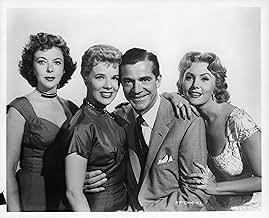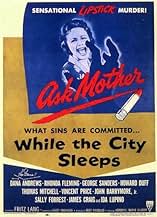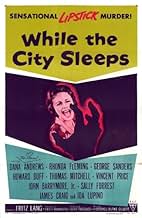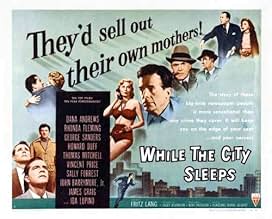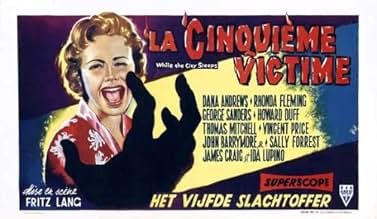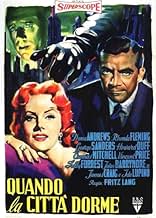Un asesino ha estado matando a mujeres hermosas en Nueva York, el propietario de una empresa de medios ofrece un trabajo de alto rango al primero de sus ejecutivos que pueda obtener las prim... Leer todoUn asesino ha estado matando a mujeres hermosas en Nueva York, el propietario de una empresa de medios ofrece un trabajo de alto rango al primero de sus ejecutivos que pueda obtener las primeras primicias sobre el caso.Un asesino ha estado matando a mujeres hermosas en Nueva York, el propietario de una empresa de medios ofrece un trabajo de alto rango al primero de sus ejecutivos que pueda obtener las primeras primicias sobre el caso.
- Dirección
- Guionistas
- Elenco
- Robert Manners
- (as John Barrymore Jr.)
- Judith Felton
- (as Sandy White)
- Tim - Police Desk Sergeant
- (as Larry Blake)
- Mike O'Leary
- (as Edward Hinton)
- Dirección
- Guionistas
- Todo el elenco y el equipo
- Producción, taquilla y más en IMDbPro
Opiniones destacadas
One of the men runs the newspaper, another the wire service, and the third's angle is to take advantage of an affair he's having with the new boss's wife (Rhonda Fleming). The first two men scheme away, determining when to broadcast information and when to hold it for maximum effect (and personal gain). They think about how to add little elements in the story, like referring to one of the victims as "the attractive librarian," in order to titillate readers. They also use personal connections in the police force in order to get direct access to information (and even watch interrogations). It all becomes a bit of a circus, and the tragedy of the murders is lost, which is of course the point.
The main character is another man, a reporter (Dana Andrews) who is not involved directly in the fray, but is doing a lot of the investigation into the murders. He's also involved in a relationship with a woman in the office (Sally Forrest), though their relationship wasn't all that inspiring to me. The real issue, however, is that his actions don't seem all that believable, e.g. Is he really going to speak directly to the killer over the airwaves in the way he does, divulging information like that? Use his fiancée as bait? Swing from getting engaged to immediately carrying on with Ida Lupino when she tempts him? And is the media really going to be tasked with solving the crime, instead of just reporting on it?
I think that to be a satire, it needed to be a little more believable, and I could have used a little bit more of a shift into the darkness of the crime itself. The ending also undermines the film's message, and it reminded me a teeny bit of Otto Preminger's critique of the justice system in 'Anatomy of a Murder' - not immediately obvious that the critique is the main point, and then an ending that seems a little off in tone.
I did like how Lang seemed to enjoy himself thumbing his nose at the production code. The affair between Fleming and Craig is crystal clear, and under the guise of telling her husband she's going to her mother's. Andrews makes it clear to Forrest that he thinks people should "find out" about each other before marriage, and Lupino later quips that all men are polygamists as she flirts with him. Before marveling at his Forrest's nightgown (a "shorty" that "you can see right through") Andrews will also say "Get your things off; it's your wedding day, you want to look nice," which had me chuckling. It makes the fact that the middle-aged married couple (Mitchell and his wife) appearing in separate beds when he's phoned in the middle of the night extra comical, and one can sense Lang was well aware of that.
Lang may have taken joy in all this and the subversive commentary about the wonders of a free press, but it's hard to fathom it being among his personal favorite films he made, particularly given his body of work. It's entertaining enough to watch though.
But Lang swiftly shifts registers; the young psycho-killer is but leaven for his loaf. His prime focus proves to be how the search to catch the culprit plays out in the executive suite of a huge media syndicate. Its founder, Amos Kyne (Robert Warwick), rules his empire from a hospital bed in his office; his last order, before his ticker tocks its last, is to label the anonymous Barrymore `the lipstick killer' and play him big. (`Kyne' seems deliberately to evoke another press magnate, Charles Foster Kane, even down to the maps showing his coast-to-coast reach and the encircled `K' logo that could have been ripped off the gates of Xanadu.)
Kyne's power, however, devolves to his pompous, petty son (Vincent Price). Knowing they hold him in contempt, he sets the heads of his various divisions to finding the killer, with a new directorship as the prize. Among the contenders are Thomas Mitchell, editor of the syndicate's flagship newspaper, the Sentinel; George Sanders, chief of its wire service; and James Craig, who runs its photo operation. Above the fray is Pulitzer-Prize winning TV commentator Dana Andrews, whose only ambition is to be left alone to pursue his drinking and his girl (Sally Forrest). Nor are any women eligible for the prize, though Price's trophy wife (Rhonda Fleming) pulls strings on behalf of her lover Craig, while mink-wrapped sob sister Ida Lupino (`Champagne cocktail. Brandy float.') initiates like maneuvers for her squeeze, Sanders.
Indifference to the prize, however, doesn't dampen Andrews' journalistic ardor. Not only does he use his broadcast to bait the `momma's boy' (who watches in his jammies as his mother, Mae Marsh, dotingly dithers around), he sets up Forrest as bait. For all his menace, Barrymore's not the brightest lad in the boroughs, and thus can be excused for mixing up his targets....
With its high-powered (and hammy) cast, its blend of psychopathology and cutthroat corporate culture, While The City Sleeps would end up standing as Lang's last American film but one (the far-fetched Beyond A Reasonable Doubt, also starring Andrews). His following so many plot strands results in a thinning of atmosphere, some fragmentation of focus there's a buoyancy of tone which was decidedly absent from his other films of the 50s, like Clash By Night or The Big Heat or Human Desire. While The City Sleeps tempers hard-core noir with more mainstream motives. It's a slick, entertaining, and at times even scary movie.
The film is set in the world of newspapers and news agencies, so you expect an aura of venality from the outset. Vincent Price is the vain, self-centered scion of a recently deceased magnate who has taken over his father's business and wants someone else to do all the work. So he creates a new executive position then sets three of his top men against each other vying for the job. The one who 'catches' or names the serial killer terrorizing women in New York, gets it.
Like many of Lang's films, "While the City Sleeps" had the tawdry feel of a B-movie. There is a kind of rough urgency to it that a more main-streamed movie might have lacked. (You could say Lang's genius was for making silk purses out of sow's ears). He didn't work with 'stars' but character players. About the biggest name in the movie and the 'star' of the picture is Dana Andrews, (superb, he was a very under-rated actor), as the Pulitzer Prize winning journalist who, like many of Lang's characters, is less noble than he first appears. As for the rest, despite there being two Oscar winners in the cast, (George Sanders, one of his poorer performances, and Thomas Mitchell, excellent), they were mainly the stable diet of the B-movie, though that said there is a terrific performance from the under-rated Sally Forrest as Andrews' girl who he is not above using as bait to catch the killer and a typically flamboyant one from Ida Lupino.
After this, Lang was to make only one more film in America before returning to his native Germany, the equally cynical "Beyond a Reasonable Doubt". Indeed it's Lang's cynicism and his critique of American values and mores that set him apart, that put him, like those other European émigrés, Otto Preminger and Douglas Sirk at a critical remove from his American counterparts. In this respect, perhaps, the only American who can be compared to him is Samuel Fuller.
I just thought it wasn't up to the lofty standard set by Lang in earlier films like 'M" and "The Testament Of Dr. Mabuse", but truth be told, these pictures were made many years before this one. Too much dialogue here, and this picture dearly needed an injection of excitement to break the tedium of the love stories in the sub-plot.
I like Dana Andrews, Thomas Mitchell, George Sanders, et al. A big boost was provided by Ida Lupino, always professional, as a sleep-around newspaper columnist. I also felt Barrymore tended toward ham in his portrayal of the psycho killer. My overall impression is of a master director who was losing his fastball, which is a shame. It could have been so much better.
5/10 - Website no longer prints my star rating.
The film, a dazzling allegory on media manipulation and modernity may not work on single viewing and perhaps that's why it's so underrated, despite a superb cast: Dana Andrews, George Sanders, Ida Lupino, Vincent Price, Mae Marsh, Rhonda Fleming and John Drew Barrymore(the son of the great John Barrymore).
In discussing the picture, Lang often compared it to his German masterpiece, "M"(1931) and the comparison is not inapt. In "M", Peter Lorre's Hans Beckert terrorizes the whole city and creates a paranoia among its citizens. In "While the City Sleeps", Manners's crimes mainly function as a gimmick for the press to sell papers while the normal life in the city seems to continue. Rather than simply conveying the necessary information in "M", the media here in "While the City Sleeps" (consisting of an interplay between television and newspaper) is much more ironic and cynical: they use Manners and his victims to terrify the public to sell more papers, something that is equally true today as it was back in 1956.
Not to be missed.
¿Sabías que…?
- TriviaThe movie was adapted from a novel; The Bloody Spur by Charles Einstein (1953) which was based on a real murder case that took place in 1946. In that year, William Heirens killed three women and left a message scrawled in lipstick on a bathroom mirror after the second murder. In the message, he urged the police to catch him before he killed again. Because of this, the press dubbed him "The Lipstick Killer".
- ErroresWhen Robert Manners (John Drew Barrymore, as John Barrymore Jr.) is watching Edward Mobley (Dana Andrews) on TV, he is clutching a copy of "Tales From The Crypt". When he drops it to the floor, a closeup of the comic book now shows it to be titled "The Strangler".
- Citas
Ed Mobely: You know, you have very nice legs.
Nancy Liggett: Aren't you sweet.
Ed Mobely: Nice stockings too. What holds your stockings up?
Nancy Liggett: There's a lot your mother should have told you.
Ed Mobely: I didn't ask my mother. I asked you.
- ConexionesFeatured in Histoire(s) du cinéma: Toutes les histoires (1988)
Selecciones populares
- How long is While the City Sleeps?Con tecnología de Alexa
Detalles
- Fecha de lanzamiento
- País de origen
- Idioma
- También se conoce como
- While the City Sleeps
- Locaciones de filmación
- Productora
- Ver más créditos de la compañía en IMDbPro
Taquilla
- Total a nivel mundial
- USD 7,652
- Tiempo de ejecución1 hora 40 minutos
- Color
Contribuir a esta página



